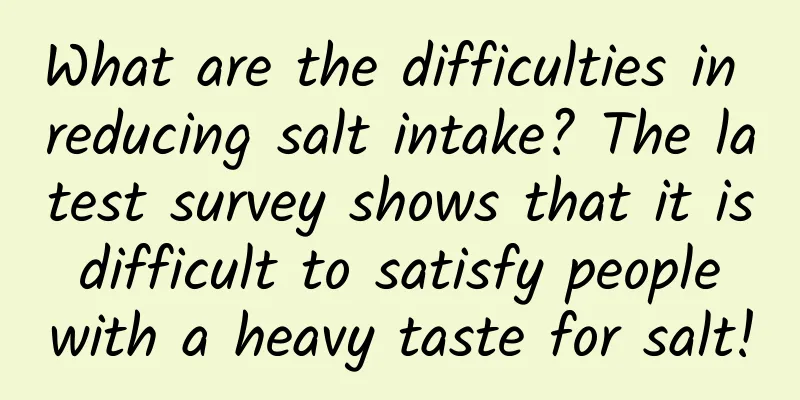What are the difficulties in reducing salt intake? The latest survey shows that it is difficult to satisfy people with a heavy taste for salt!

|
When it comes to healthy eating, many words may come to mind, such as balanced nutrition, Mediterranean diet, intermittent fasting, etc. But when it comes to unhealthy eating, people often think of sugary drinks, carbon bombs, fried foods, etc. According to research results published by the international authoritative academic journal The Lancet, the most fatal problem in the Chinese diet is not sugary drinks (ranked only 12th) [[1]], but eating too much salt (sodium). The World Health Organization once warned that a high-sodium diet is closely related to high blood pressure and cardiovascular disease [[2]]. Delicious food: the biggest challenge for Chinese people in reducing salt intake 80% of the sodium consumed by Chinese people comes from three meals a day, of which salt is the absolute main source, so reducing salt in the kitchen is undoubtedly the main problem. After years of unremitting efforts, China's per capita salt intake has dropped from 13.9 grams in 1992 to 9.3 grams in 2015-2017, but it is still a long way from the dietary guideline recommended amount of 5 grams. Why is it so difficult to reduce salt in the kitchen? Is it that people don't know the importance of reducing salt, or are they unwilling to do so? Data from the Kexin Food and Health Information Exchange Center shows that nearly 70% of respondents believe that reducing salt has a high health significance, more than 60% of respondents believe that they need to reduce salt, and nearly 70% of respondents are trying to reduce salt. However, salt is the most important flavor, and more than 50% of respondents said that the biggest obstacle to reducing salt is the difficulty in giving up the taste. Will it take China another 30 years to meet salt control standards? Food is one of the sources of happiness for Chinese people, so consumers generally do not accept a large reduction in salt intake, and a slow and gradual reduction in salt intake is the result of "trading time for space". Over the past 20 years, the average salt intake of Chinese people has decreased at an average annual rate of 1.7%. Based on this rough calculation, it will take about 30 years to achieve the 5-gram target recommended by the Chinese Dietary Guidelines. Zhong Kai, director of the Kexin Food and Health Information Exchange Center, said that many consumers think that food tastes worse if there is less salt, but in fact, taste buds are not that sensitive to saltiness. Consumer tests show that reducing salt by 5%-10% will not have a significant impact on saltiness. If everyone can reduce salt by 5% each year, the ultimate control goal can be achieved within 10 years. Of course, this is just a beautiful vision and optimistic estimate, which must be achieved through the joint efforts of consumers and the industry. How to effectively control salt in the home kitchen Chen Junshi, an academician of the Chinese Academy of Engineering, believes that the initiative of controlling salt intake is in everyone's hands. When sprinkling salt and chicken essence, shake less and pour a few drops of soy sauce. Without such active control awareness, salt-limiting spoons and salt-reducing seasonings will not play their due role. If you want to "reduce salt without reducing saltiness", a very convenient and effective way at this stage is to use low-sodium salt, because low-sodium salt has 20%-35% less sodium than traditional salt at the same saltiness. Of course, a few people who are not suitable for high potassium intake, such as patients with kidney disease, need to consult professional doctors. In addition, you can flexibly use spices such as chili, pepper, onion, ginger and garlic, which will stimulate the taste buds to produce a stronger sense of saltiness. Sprinkle salt before cooking, so that the salt can remain on the surface of the dish instead of penetrating into the inside, and can be better felt by the tongue. He also reminded that the taste perception of the elderly is degraded and they are less sensitive to saltiness, so they need to pay more attention to reducing salt. In addition, food companies are encouraged to innovate and develop more condiments that can reduce sodium and taste good. [[1]] Afshin, A., Sur,PJ, Fay, KA, Cornaby, L., Ferrara, G., Salama, JS, Abebe, Z. (2019). Health effects of dietary risks in 195 countries, 1990–2017: a systematic analysis for the Global Burden of Disease Study 2017. The Lancet, 393(10184),1958–1972. doi:10.1016/s0140-6736(19)30041-8 [[2]] https://www.who.int/zh/news-room/fact-sheets/detail/salt-reduction |
Recommend
Quantitative analysis of remaining opportunities in 2C Internet
Winter is here. The term "capital winter&quo...
Can I wait at a traffic light without pulling the handbrake? Why is the handbrake frozen in winter?
The handbrake is the parking brake, which is usua...
What to do if the cervix is loose
If you find that your cervix is loose during a ...
Can patients with uterine fibroids eat persimmons?
Uterine fibroids are a disease that troubles many...
What foods are taboo for pregnant women?
I believe everyone knows the importance of food t...
How to remove acne scars, six recommended scar removal methods
Acne is probably a skin disease that all women ha...
How to get pregnant with a backward uterus?
Women with a posterior uterus are more likely to ...
What causes stomach pain in early pregnancy?
Some netizens are concerned that stomach pain, bl...
Pregnancy: progesterone and villus stimuli
Women will not feel that they are pregnant in a s...
90% of diseases are caused by imbalance of internal and external factors
The spokesperson of the Ministry of Health once a...
World Hepatitis Day——Lots of “liver” goods are coming!
Author: Li Jiecheng Peking University People'...
Will taking a bath or exercising after having sex make the condition worse? Many people ignore these 4 things
I avoided the first day but couldn't avoid th...
How to eliminate breast lumps during lactation
Many breastfeeding mothers are troubled by breast...
Drinking tea for health? Drinking tea this way may be detrimental to your health!
Talking about tea From West Lake Longjing, Huangs...
[Medical Q&A] How to treat acne that keeps popping up?
Planner: Chinese Medical Association Reviewer: Zh...









